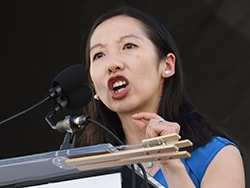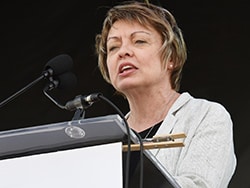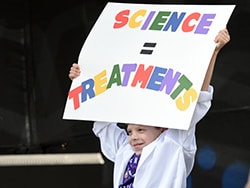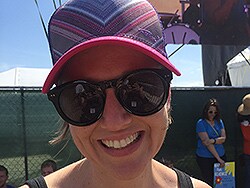WASHINGTON, DC — At the second annual March for Science, speakers here called for political action using science to inform some of the most pressing public health issues of the day, including the opioid crisis, gun violence, and ongoing funding of research for medical cures.
The rally and march, held here on Saturday, April 14, were among more than 200 March for Science events taking place around the United States and abroad. The DC audience appeared smaller than last year’s at the 12:30 pm rally start time but had swelled by the time the march began around 3 pm.

March for Science 2018. Olivier Douliery
Crowd estimates weren’t available as of Monday morning, but big numbers weren’t the main goal this time around anyway, interim executive director of the March for Science, Caroline Weinberg, MD, MPH, told Medscape Medical News. “Last year was more about bringing a ton of people out in support of science. This year there’s much more of a focus on direct advocacy and calls for action.”
Regarding the public health arena in particular, Weinberg noted that “there’s a lot of lack of science informing policy,” citing the example of the debate around the Affordable Care Act. “Not enough people were talking about what the evidence shows when people have health insurance…The goal is to make sure that when these conversations happen people are also talking about how we can use evidence to inform equitable policies that help everyone. That is our push.”
Indeed, the overall mission of the March for Science organization — which holds a variety of science-oriented activities and campaigns year-round — calls for “robustly funded and publicly communicated science as a pillar of human freedom and prosperity. We unite as a diverse, nonpartisan group to call for science that upholds the common good, and for political leaders and policymakers to enact evidence-based policies in the public interest.”
As was the case last year, a handful of speakers addressing health-related topics joined scientists from a wide range of other disciplines in the shared goal of promoting science and combatting the misinformation that has arisen around issues such as climate change.
“Science Shows Us That Addiction Is a Disease”
Baltimore Health Commissioner Leana S. Wen, MD, gave an impassioned speech calling for more money toward the purchase of naloxone to treat more people who are addicted to opioids. Soon after becoming health commissioner in January 2015, Wen issued a blanket prescription for naloxone to all of Baltimore’s residents. That program has saved more than 1700 lives, but there’s still not enough of the medication to meet the need.

Leana S. Wen, MD, Baltimore health commissioner. Olivier Douliery
“Science shows us that addiction is a disease and not a moral failing, that treatment works, and recovery is possible. Yet, we are limited in our ability to save lives because we don’t have enough naloxone to pass out in Baltimore. It doesn’t make sense that we have to ration medications in the middle of an emergency,” she told Medscape Medical News in an interview.
During her rally speech, Wen, who previously worked as an emergency physician, told the story of a young woman who came into the emergency department seeking help for addiction but was turned away because no beds were available for 3 weeks. Two hours later the woman returned, having overdosed, and died.
“The official cause of death was overdose. The real cause? Failure of our system. Failure of our society. Failure of our humanity,” Wen said, adding, “I march today because healthcare must be a right, not a privilege. I march because we must have science, not silence…We have to get up and we have to speak up.”
“Gun Violence Is a Public Health Issue”
Speaker Susan B. Sorenson, PhD, professor of social policy at the University of Pennsylvania, Philadelphia, is an expert and researcher on the health and social impact of gun violence. She decried the absence of government funding into the field, noting that the US Centers for Disease Control and Prevention has not conducted gun violence research since Congress rescinded funding 2 decades ago.

Susan B. Sorenson, PhD, University of Pennsylvania. Olivier Douliery
“The premiere public health agency in the country does not fund research on firearms. Even when directed to do so by former President Barack Obama, CDC did not undertake or fund research on firearms,” she told the audience.
The National Institute of Justice has funded some research on firearms, but only a “slice of the nation’s problem with firearms,” she said, adding that the National Institutes of Health (NIH) hasn’t funded the field either, “despite gunshot wounds clearly being a threat to good physical health and mental health.”
Instead, most of the work being done currently comes from private foundations, she noted.
Speaking with Medscape Medical News, Sorenson pointed out that despite the lack of funding, there is science on gun violence dating back more than 20 years. For example, the landmark “tale of two cities” study published in the New England Journal of Medicine in 1988 demonstrated that restricting access to handguns may reduce the rate of homicide in a community. (That study was funded by the CDC before the restrictions.)
“We need science to make decisions about policies, and for people to make decisions about their own personal lives. Some people and some politicians will make their decisions based on things other than science. We all do. My main message is that it should be taken into account.”
“I Don’t Have That Kind of Money in My Big Blue Piggybank”
The youngest speaker at the rally, 9-year-old Max Schill, was born with Noonan’s syndrome, a rare genetic disorder of the RASopathy family, characterized by short stature, congenital heart defect, variable developmental delay, and a range of other physical abnormalities.

Max Schill, born with Noonan’s syndrome. Olivier Douliery
Despite his condition, the boy is a frequent speaker and advocate for rare diseases. His personal lobbying of members of Congress is credited with helping to enable the 2016 passing of the 21st Century Cures Act.
“There are over 7000 rare diseases affecting 30 million Americans. Ninety-five percent have no treatment. Treatment costs billions. I don’t have that money in my big blue piggybank. That’s why I asked for 21st Century Cures, to smack down horrible diseases,” Schill, standing on a riser and wearing a white coat, told the audience, to laughter and applause.
Max’s mother, Lisa Schill, told Medscape Medical News that she became involved in lobbying soon after Max was born, and she now helps run a rare diseases advocacy group. “One of my goals is getting more treatments and cures for more people with rare diseases,” she said, adding that she realized early on that “It’s just too many bake sales. I realized that changing policy was the way to go.”
She said that although Max has endured tumors in his jaw, a tethered spinal cord, and a bleeding disorder, “He’s functioning. He’s lucky. That’s why we fight so hard, because we know what the other side can be.”
In his speech, Max told the crowd, “There is so much more we need to do to help increase medical research funding…. We need to call, write and visit our members of Congress and ask for their help. We need to work together as a bipartisan team.”
Health Professionals in the Crowd: A United Purpose
Rally and march participant pediatric hematologist/oncologist Joel A. Weinthal, MD, travelled from Dallas, Texas, for the second year in a row for the event. “I think it’s incumbent on all of us to [push for] all of the priorities of this march, including science education, science funding, and not just education for students but for all people in the world, trying to combat misinformation.”
Weinthal, who conducts stem cell research, also noted that “Science funding is a major challenge. People don’t understand what it takes to do good science…. It’s just so important.”
Participant Olivia Bartlett, PhD, is a microbiologist/virologist who previously worked for both the National Institute of Allergy and Infectious Diseases and the National Cancer institute, both as a researcher and later in peer review. Now retired from NIH, she’s a full-time advocate with Do the Most Good, a “progressive, grass-roots organization” formed in December 2016 by a small group of Hillary for America volunteers.
Bartlett and her husband attended the DC March for Science last year and “we came again because we’re just appalled at the science deniers, the lack of incorporation of science into public policy, and the undermining of science,” she told Medscape Medical News.
Medical professionals, she said, “need to speak up, not be silent, get involved, and say that what’s going on in denying and censoring science is unacceptable.”
Rachael O. Postman, DNP, FNP, a family nurse practitioner who works in a federally qualified health clinic in Portland, Oregon, travelled to DC, where she has relatives, for this year’s march. Last year, she participated in the Portland March for Science. Asked for her motivation to travel to DC this year, she responded, “Rational, evidence-based policy.”

Rachel O. Postman, DNP, FNP, family nurse practitioner. Miriam Tucker
Postman elaborated, “We’re lucky in Oregon. We have a pretty progressive government that expanded Medicaid, which allowed for us to serve low-income families better than other states. But it’s still a struggle…. I have patients who lose insurance because of a job change or forget to re-apply and have to see a different provider and it really disrupts their care. It’s just crazy. I think we can do a lot better, and that’s why I’m here.”
Weinthal is a speaker for Sanofi and Shire. None of the other quoted speakers or attendees have disclosed any relevant financial relationships.
For more diabetes and endocrinology news, follow us on Twitter and on Facebook.
Tidak ada komentar:
Posting Komentar